
Best Magento Hosting Options in 2024: Top 6 Magento Hosts
Confused between the different Magento hosting options available? This article guides you to the top Magento hosting options in 2024.
Key Takeaways
-
Choose the right Magento hosting type (shared, VPS, dedicated, cloud) based on traffic, resource needs, and growth potential.
-
Evaluate hosting providers for performance optimization, security features, and scalability to match your e-commerce demands.
-
Consider both current and future Magento hosting needs, including support, maintenance, and the ability to handle traffic spikes.
-
Investigate the top Magento hosting providers like MGT-Commerce for their unique features and services.
-
Stay updated on hosting trends, such as AI, edge computing, and sustainable solutions for future-proofing your e-commerce store.
Types of Magento Hosting Servers
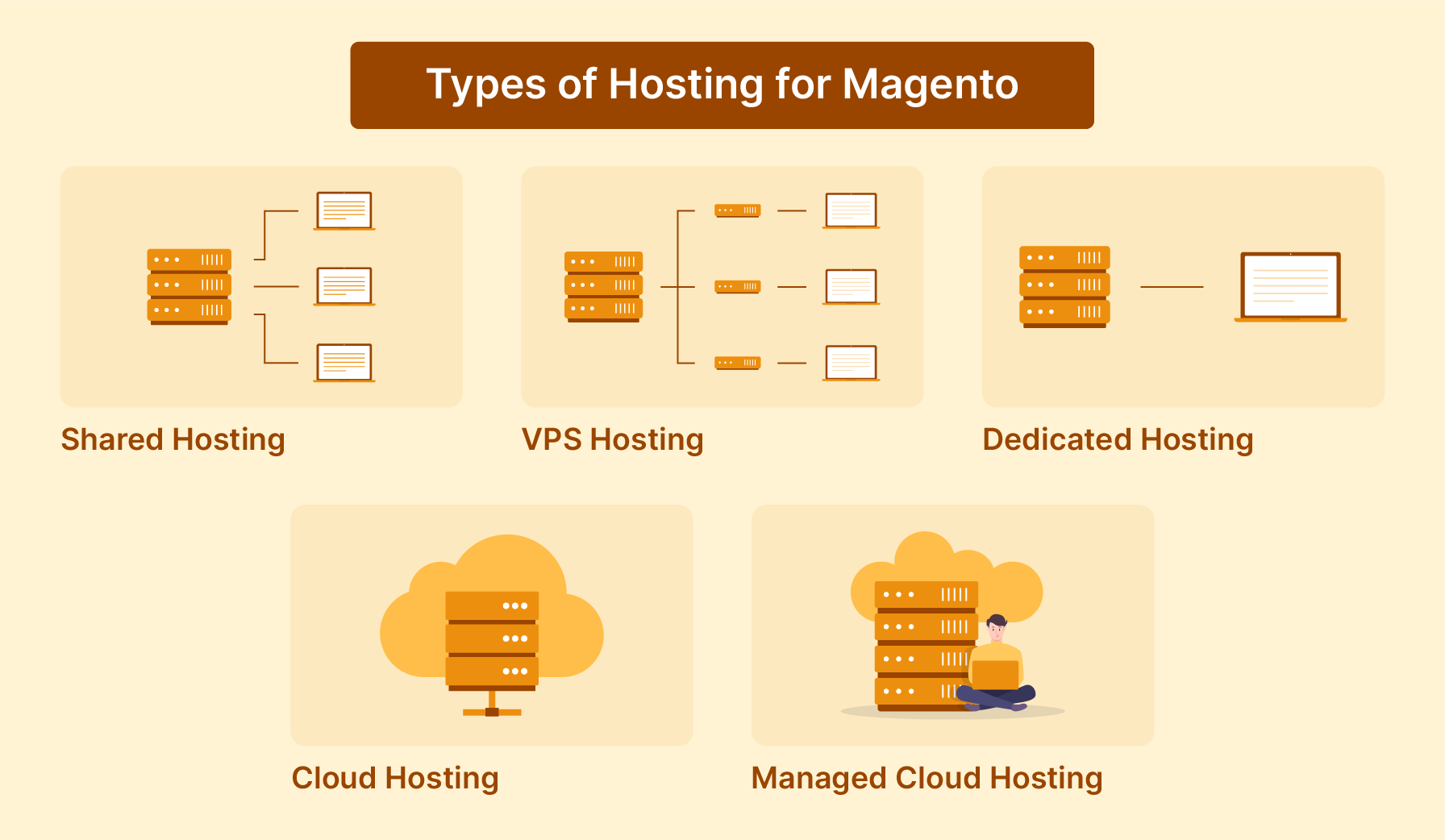
1. Shared Hosting
Shared hosting is an inexpensive option. It means your website shares server resources with other sites. It's great for new or low-traffic sites. However, the shared nature can cause performance issues and limited scalability.
2. VPS Hosting
VPS Magento hosting service offers more resources and control than shared hosting. It means hosting a website on a separate virtual server. VPS hosting is great for Magento websites, but it may have limits on scalability and performance.
3. Dedicated Hosting
Your website only uses one server in dedicated hosting. This means it has dedicated resources. However, scaling can be limited and costly. For high-traffic or enterprise-level stores, dedicated hosting is ideal. It provides a whole server for your site. This ensures excellent performance and flexibility. But it's also the most expensive option. It guarantees the resources needed for top-tier performance.
4. Cloud Hosting
Cloud hosting is a popular and flexible choice. You can start with a basic server and increase resources as your business grows. It offers better performance than other Magento hosting options.
Cloud hosting uses virtual servers to provide resources. If one server fails, your site won't go down. It's a scalable and flexible solution for sites with varying traffic patterns and those looking to manage costs effectively.
Assessing Your Magento Hosting Needs
To make an informed decision, start by understanding your store's needs. Evaluate these factors when assessing your hosting requirements:
1. Traffic Volume
Busy stores require additional server resources to ensure optimal speed and performance during peak periods. Calculating your average and expected traffic is important to select the appropriate hosting type and plan.
2. Resource Intensity
The complexity of your store affects the resources needed for your website. This includes the number of products, extensions, and customers online simultaneously. It impacts your site's CPU, RAM, and storage space.
3. Support and Maintenance
Magento is a powerful platform. It needs regular maintenance, updates, and support. Assess your team's technical skills. Decide how much you can handle internally or from your hosting provider.
4. Page Speed Optimization
Page speed is important for user experience and search engine rankings. Fast-loading pages reduce bounce rates and improve conversions. When selecting a Magento hosting provider, ensure they offer performance optimization tools and technologies like content delivery networks (CDNs), caching solutions, and optimized server configurations.
5. Upgrades
Consider the ability to scale your hosting infrastructure as your store grows. Your Magento hosting solution should accommodate traffic spikes without compromising performance. Look for providers that offer easy upgrades to resources or plan migrations to ensure your hosting can grow with your business.
Evaluating Critical Hosting Features for Magento
1. Performance Optimization
High performance is paramount for e-commerce stores. Look for hosting providers that offer SSD storage, CDN integration, and advanced caching mechanisms to enhance site speed.
2. Security Measures
E-commerce sites are prime targets for cyber threats. Ensure your hosting service provides robust security features such as SSL certificates, regular backups, and malware protection.
-
SSL Encryption: Secure data transmission.
-
Server Monitoring: Continuous monitoring for issues.
-
Firewalls: Filter traffic to enhance security.
-
Security Patches: Regular updates to protect against vulnerabilities.
-
Website Backups: Critical for data recovery in unforeseen events.
3. Scalability
Your hosting solution needs to grow as your business grows. Scalability ensures your website can handle more visitors and resource demands without big problems.
4. Customizability
Magento stores often need custom configurations. Select a host that allows the customization and control you need for your unique store.
Top 6 Magento Hosting Options
| Hosting Provider | Key Features | Price |
|---|---|---|
 |
Fastest Magento hosting websites with a Page Load Time of under 0.3 seconds | € 149/month |
 |
Affordable and reliable hosting provider | $10/month |
 |
Cheapest hosting service | $1.39/month |
 |
Expert Magento hosting option | $49/month |
 |
Most reliable hosting service | $159.99/month |
 |
Optimize website performance | $2.99/month |
1. MGT-Commerce
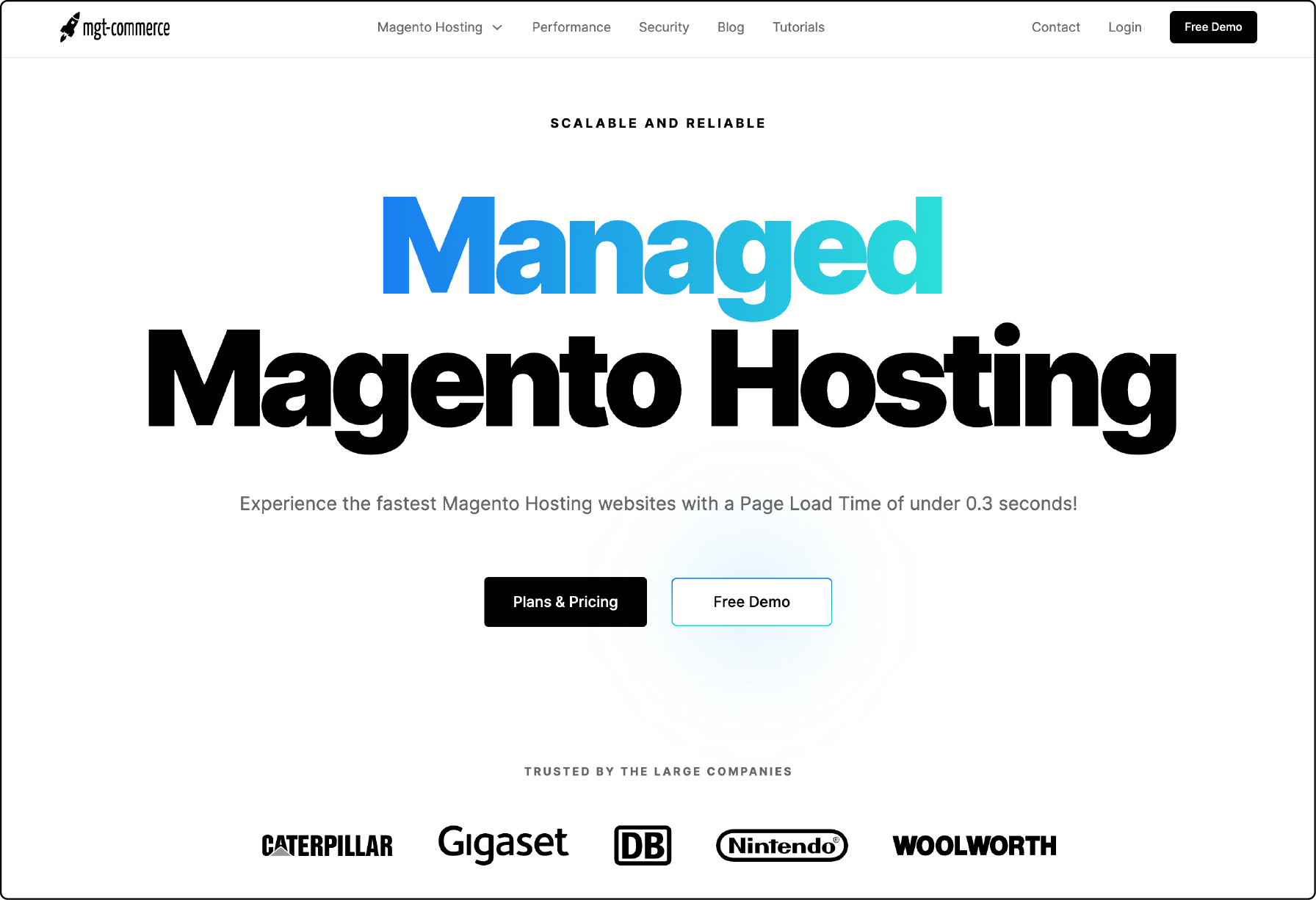
Choose MGT-Commerce to get the fastest managed Magento 2 hosting services on AWS. It ensures seamless performance and reliability for your online store. You get free migration to AWS, guaranteed uptime, expert support, and high-performance hosting.
With it, you get a unique MGT Control Panel. It streamlines management and enhances efficiency. Renowned for exceptional performance and support, MGT-Commerce is the ideal hosting provider. It caters to businesses seeking optimized Magento 2 hosting.
Key features are:
-
High-Performance Hosting Technologies: Experience the power of cutting-edge hosting technologies.
-
Fully Managed Magento 2 Cloud Hosting: Enjoy hassle-free hosting with our fully managed Magento 2 cloud solution.
-
Multi-Server Configuration: Optimize your website's performance with a multi-server configuration.
-
Server Security: Rest easy, knowing your server is safeguarded with top-notch security measures.
-
Free Migration: Seamlessly migrate your website to our hosting platform at no additional cost.
-
Scalability: Scale your website effortlessly to accommodate growing traffic and demands.
-
Deployment tool: Streamline your deployment process with our user-friendly tool.
-
Global Availability: Reach a global audience with our hosting solution in multiple locations.
-
Monitoring & 24/7 Support: Benefit from continuous monitoring and round-the-clock support.
-
SSL Certificate: Ensure secure communication with an included SSL certificate.
-
Magento Optimization: Enhance the performance of your Magento website with our optimization techniques.
-
Hourly Backups: Protect your data with regular hourly backups.
-
Flexible Pricing Plans: Choose from various flexible pricing plans tailored to your needs.
2. Cloudways
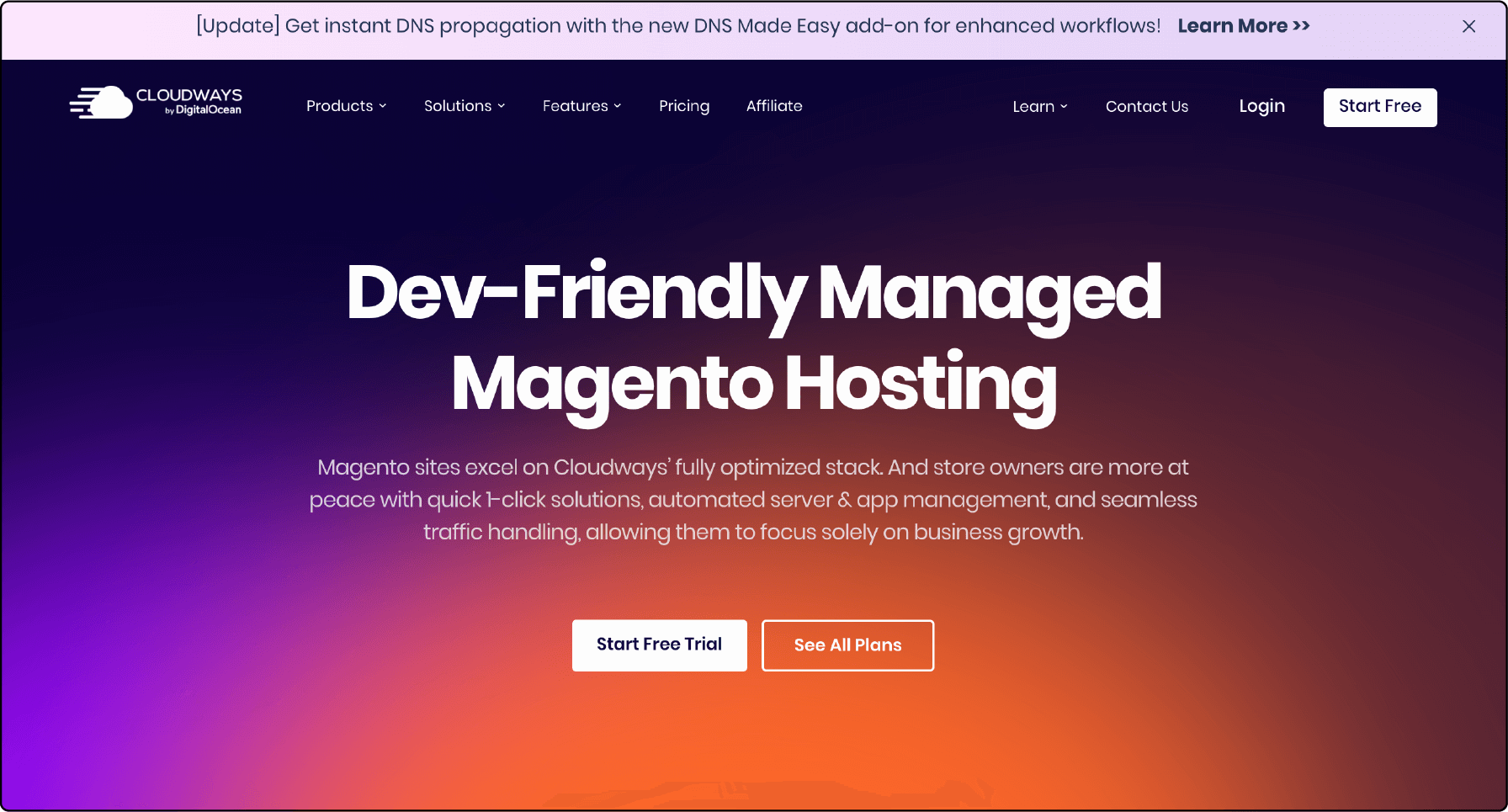
Cloudways is the preferred Magento hosting provider, offering unique features for merchants, startups, agencies, and developers. With its fast content delivery network and optimized stack, Cloudways ensures quick loading times for eCommerce Magento stores. Choose from multiple plans, enjoy easy installation, and benefit from a convenient backup process.
Cloudways provides powerful features for server performance, security, and scalability. From Vertical Scaling to ThunderStack, it offers excellent options for optimizing application performance. With robust security and enhanced caching, Cloudways is an ideal choice for Magento online stores and more.
With Cloudways, you will find flexible pricing plans to suit various budgets. The Standard Plan costs $10/month and includes 25GB storage and 1TB bandwidth. The top-tier package offers 160GB storage and 5TB bandwidth for more extensive needs at $80/month.
3. Hostinger

Hostinger offers affordable pricing and beginner-friendly options like shared and cloud hosting, catering to users of all levels. With fast loading speed and free SSL Certificate Activation for security, it's a top choice for website hosting. Small and personal sites can benefit from the standard SSL Certificate Activation. On the other hand, larger eCommerce sites can opt for the enhanced Comodo PositiveSSL Certificate for better performance.
It offers support for the latest MySQL updates and multi-tier Litespeed cache, resulting in improved cart performance and the ability to handle multiple inquiries. Hostinger provides Magento 2 hosting through its cloud hosting options, offering 3 cloud plans with unlimited websites, unlimited bandwidth, and a free domain name.
The Cloud Startup plan costs $7.45/month and includes 2 CPU cores, 100GB SSD storage, and 3GB RAM. The Cloud Professional plan starts at $14.95/month, while the Cloud Global plan starts at $37.00/month and provides 8 CPU cores, 200GB SSD storage, and 16GB RAM.
4. Nexcess
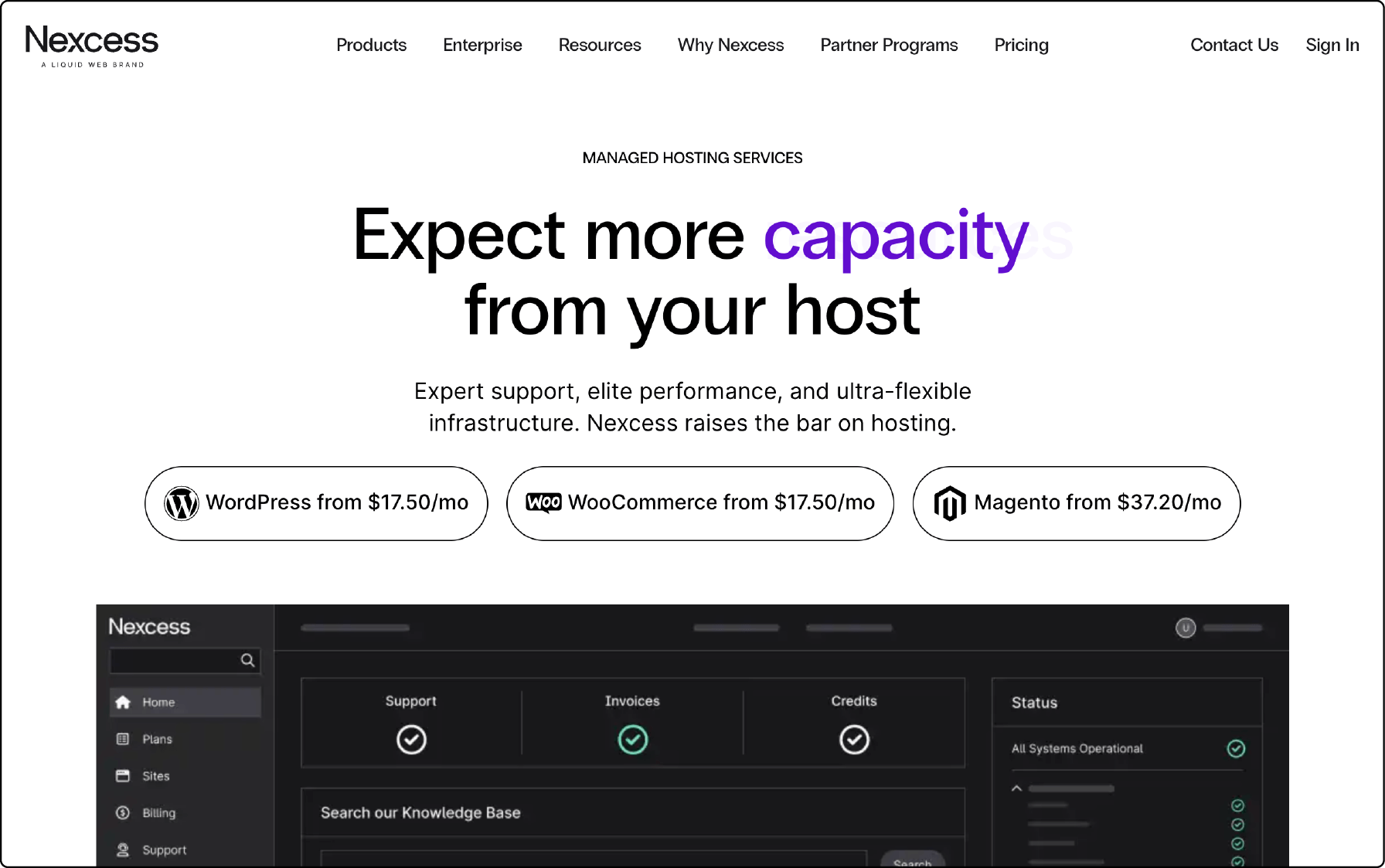
Nexcess: a flexible and speedy managed Magento Cloud hosting solution. Scale, accelerate, and expand your eCommerce business with ease. Benefit from quick migrations, asset-caching, team management, backups, and robust security. Also includes a Content Delivery Network (CDN) for stable performance during traffic surges.
Nexcess offers hosting plans tailored for Magento, with features to optimize site speed. They provide site staging, performance testing, troubleshooting suggestions, and options for Progressive Web Apps and PCI compliance.
Pricing starts at $49/month for the XS package, with the XXL package at $849/month. These packages offer benefits like concurrent users, disk space, domains, bandwidth, VCPU, and RAM.
5. InMotion
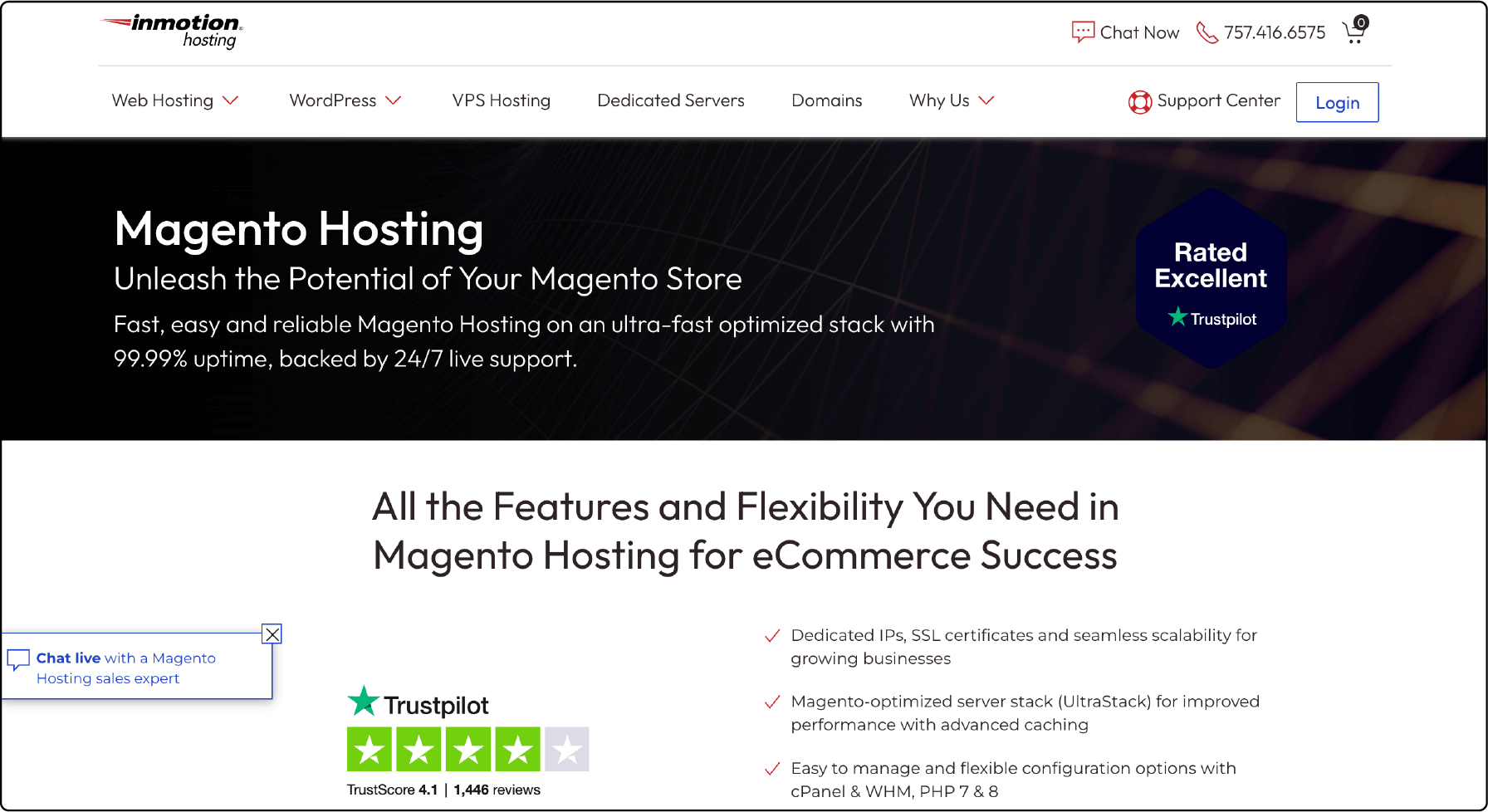
InMotion is well-known for its top-notch web hosting services. They offer advanced features and exceptional support. With 5 hosting options available - shared, WordPress, VPS, dedicated servers, and reseller hosting - they cater to diverse needs.
InMotion's business hosting is ideal for small eCommerce stores, providing essential features at an affordable price. It includes a free domain, a user-friendly website builder, and robust security with SSL certificates and DDoS protection. For growing needs, consider upgrading from shared hosting to InMotion's managed VPS hosting. It offers advanced server management, unlimited MySQL database support, and automated security updates.
InMotion offers optimized Magento hosting with dedicated servers, ensuring top website performance. With multi-layer security and free SSD, their managed VPS plans start at $29.99/month, offering a range of memory and disk space options. Choose the plan that suits your needs and budget for optimal results.
6. A2 Hosting

A2 Hosting is a renowned hosting provider for Magento sites. They have a strong emphasis on security and customer satisfaction. A2 Hosting offers a range of hosting options: Shared, WordPress, VPS, Cloud, Dedicated, and Reseller. All plans include a free cPanel control panel, SSL certificate, and unlimited SSD storage and transfer.
A2 Hosting's Perpetual Security initiative offers advanced firewall protection, limited server access, and reinforced DDoS protection for a secure hosting experience.
With shared plans starting at $6.99/month and VPS plans from $43.99/month to $65.99/month, A2 Hosting provides stable server resources, reliable performance, and 20x faster speed with the Turbo package. Enjoy unlimited storage, automatic backups, and free site migration.
Case Studies in Magento Hosting Success
1. Coca Cola

Coca-Cola has successfully utilized Magento hosting to enhance its digital user experience and market its products effectively. Coca-Cola has improved customer engagement and achieved impressive results. They did this by leveraging the Adobe Experience platform, including Adobe Commerce, Target, and Analytics.
Their campaign "Coca-Cola at your home" in Mexico achieved impressive results. Within a year, they saw a remarkable 45% increase in new accounts and an 18% rise in average order value. Notably, the brand used Magento 2 to ensure water availability in underserved areas during the pandemic, demonstrating the positive impact of the platform.
2. The Procter and Gamble Company

Procter and Gamble (P&G) is a multinational consumer goods corporation. They rely on Magento hosting for their eCommerce needs. Magento offers features like shared catalogs, company accounts, and ERP integrations. This has proven to be beneficial for P&G.
It helps them manage their B2B client portal. It streamlines sales, pricing, and inventory across multiple sources. In 2020, P&G generated $71 billion in revenue. Their trust in Magento showcases its effectiveness in showcasing their iconic brands and managing online operations efficiently.
3. Nike

Nike, known for its popular apparel website, sought flexibility and scalability to expand seamlessly. They turned to Magento for their eCommerce needs, implementing two global strategies, CDO and CDA, to target various markets and boost D2C sales.
With a Magento website, Nike enabled direct-from-Facebook shopping and introduced AR and VR features like online try-on and sneaker customization. This enhanced shopping experience led to a doubling of sales, showcasing the impact of Magento hosting for Nike.
Best Practices for Sustaining a Magento Hosting Partnership
A successful hosting partnership isn't just about selecting the right provider; it's also about fostering a relationship built on mutual growth and prosperity. Consider these best practices:
1. Regular Reviews
Set a cadence for reviewing your hosting needs and provider services. As your business evolves, your hosting requirements may change, and it's essential to ensure your current host can still meet those needs.
2. Stay Informed
Stay informed of the latest hosting trends, technologies, and services. Continuous learning will aid you in making informed decisions when considering updates or changes to your hosting plan.
3. Engage with Community
Join forums, discussions, and industry groups to share experiences and learn from others. The Magento community is a vast knowledge repository that can offer valuable insights to enhance your hosting experience. Additionally, staying connected can help you stay updated on any changes or updates in the Magento platform.
Future of Magento Hosting
1. AI and Automation
AI-driven solutions automate site performance optimizations and security monitoring tasks. This leads to more efficient and proactive hosting services. As Magento continues to evolve, we can expect to see more AI and automation capabilities incorporated into hosting services.
2. Edge Computing
It brings servers closer to the user, reducing latency and improving speed. Hosting providers will continue expanding their edge locations network to offer better global coverage.
3. Sustainable Hosting
The hosting industry is moving towards more sustainable practices. Look for providers that offer green hosting solutions, which not only reduce your environmental impact but can also be a selling point for eco-conscious consumers. Expect to see more hosting providers adopting sustainable practices in the future.
FAQs
1. How do hosting companies ensure minimal downtime?
Hosting companies ensure minimal downtime by investing in high-quality infrastructure. This includes state-of-the-art data centers, robust hardware, and redundant systems. They often provide an uptime guarantee, promising an operational hosting environment for some time, typically above 99.9%.
Additionally, they may use technologies like Nginx and Varnish to optimize web server speeds and efficiently handle high traffic volumes. Downtime is also mitigated by employing expert teams who monitor and manage hosting platforms around the clock.
2. How does support vary between hosting services?
Customer support varies among hosting services with differences in availability, expertise, and assistance channels. Examples include MGT-Commerce, GoDaddy, SiteGround, and HostGator.
3. Can I switch hosting providers if I'm unsatisfied with my current service?
Yes, you can switch hosting providers if unsatisfied with your current service, and many companies facilitate this process. Look for hosts that offer migration support - some even do this at no extra cost.
4. What are some reasons to choose cloud hosting over traditional hosting for Magento?
Cloud hosting offers several advantages over traditional hosting for Magento. These include scalability, reliability, and typically better performance. Thanks to the distributed resources, cloud servers can handle sudden spikes in traffic. This is ideal for internet shops experiencing variable traffic.
In addition, cloud hosting plans often come with an easy-to-use interface. This offers convenience and control over hosting resources. Companies like Google Cloud, and Amazon Web Services, provide specialized cloud hosting services. These services match the demanding server requirements of Magento platforms.
5. What is the difference between Linux and Windows-based hosting solutions?
Linux and Windows-based hosting solutions differ primarily in their operating systems. These differences affect the applications and software they can support. Linux hosting generally offers greater compatibility with open-source technologies like PHP, Apache, and MySQL. This makes it a preferred choice for Magento stores.
On the other hand, Windows hosting is best suited for applications requiring ASP.NET or Microsoft SQL Server. When choosing a hosting solution, it's important to match the hosting environment with the software requirements of your store.
6. Should business owners prioritize eco-friendly hosting solutions?
Business owners should consider eco-friendly hosting solutions. These solutions represent a commitment to reducing environmental impact. Many customers prefer to support companies with sustainable practices. This can enhance a brand's reputation.
Eco-friendly hosting can involve using renewable energy. It can also include carbon offset initiatives and energy-efficient hardware like AWS Graviton. As the world moves towards more sustainable business practices, green hosting can be both an ethical choice and a competitive advantage.
Summary
Choose a managed Magento hosting option that balances performance, support, and sustainability. When deciding, consider server resources, scalability, support quality, and environmental impact.




